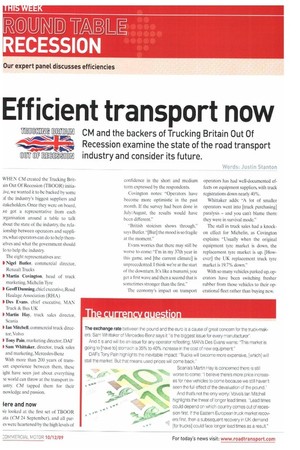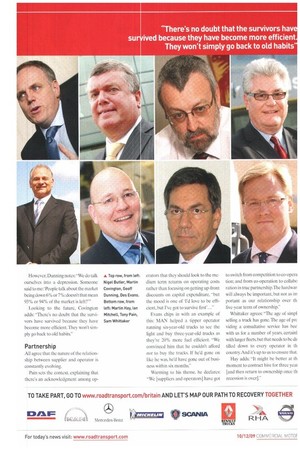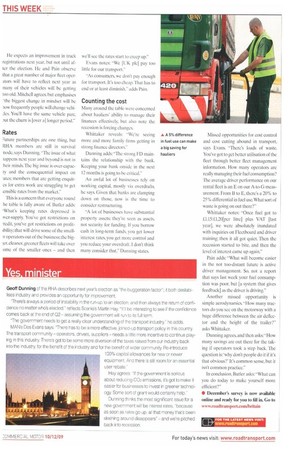Efficient transport now
Page 16

Page 17

Page 18

If you've noticed an error in this article please click here to report it so we can fix it.
CM and the backers of Trucking Britain Out Of Recession examine the state of the road transport TErgovmmaini industry and consider its future. MUDEUrt 132E1E
z
Words: Justin Stanton
WHEN CM created the Trucking Britain Out Of Recession (TBOOR) initialye, we wanted it to be backed by some 31 the industry's biggest suppliers and ;takeholders. Once they were on hoard, .ve got a representative from each lrganisation around a table to talk ibout the state of the industry, the relaionship between operators and suppli;rs, what operators can do to help them;elves and what the government should lo to help the industry The eight representatives are: Nigel Butler. commercial director, Renault Trucks II Martin Covington, head of truck marketing, Michelin Tyre II Geoff D min ing,chief executive, Road Haulage Association (RHA) P Des Evans, chief executive, MAN Truck & Bus UK I Martin Hay, truck sales director. Sea nia Ian Mitchell. commercial truck director, Volvo I Tony Pain, marketing director, DAF I Sam Whittaker, director, truck sales and marketing, Mercedes-Benz With more than 200 years of transort experience between them, these ight have seen just about everything le world can throw at the transport inustry. CM tapped them for their nowlcdge and passion.
lere and now
looked at the first set of TBOOR ata (CM 24 September), and all pares were heartened by the high levels of confidence in the short and medium term expressed by the respondents Covington notes: "Operators have become more optimistic in the past month. If the survey had been done in July/August, the results would have been different.
"British stoicism shows through," says Butler. "[But I the mood is so fragile at the moment."
Evans worries that there may still he worse to come: "I'm in my 37th year in this game, and [the current climate] is unprecedented.! think we're at the start of the downturn. It's like a tsunami, you get a first wave and then a second that is sometimes stronger than the first.
The economy's impact on transport operators has had well-documented effects on equipment suppliers, with truck registrations down nearly 40%.
Whittaker adds: -A lot of smaller operators went into [truck purchasing] paralysis — and you can't blame them: they were in survival mode."
The stall in truck sales had a knockon effect for Michelin, as Covington explains: "Usually when the original equipment tyre market is down, the replacement tyre market is up. [However] the UK replacement truck tyre market is 19.7% down.
With so many vehicles parked up, operators have been switching fresher rubber from those vehicles to their operational fleet rather than buying new. However, Dunning notes: "We do talk ourselves into a depression. Someone said to me:People talk about the market being down 6% or 7%; doesn't that mean 93% or 94% of the market is left?-' Looking to the future, Covington adds: "There's no doubt that the survivors have survived because they have become more efficient. They won't simply go back to old habits."
Partnership All agree that the nature of the relationship between supplier and operator is constantly evolving.
Pain sets the context. explaining that there's an acknowledgment among op erators that they should look to the medium term returns on operating costs rather than focusing on getting up-front discounts on capital expenditure, "but the mood is one of 'I'd love to be efficient, but I've got to survive first'...
Evans chips in with an example of this: MAN helped a tipper operator running six-year-old trucks to see the light and buy three-year-old trucks as they're 20% more fuel efficient. "We convinced him that he couldn't afford not to buy the trucks. If he'd gone on like he was, he'd have gone out of business within six months."
Warming to his theme, he declares: "We [suppliers and operators] have got
to switch from competition to co-opera tion; and from co-operation to collabo ration in true partnership.The hardwan will always be important, but not as im portant as our relationship over th five-year term of ownership."
Whittaker agrees: "The age of simpl selling a truck has gone. The age of prc viding a consultative sei-vice has bee with us for a number of years, certainl with larger fleets, but that needs to be di tilled down to every operator in th country And it's up to us to ensure that,
Hay adds: "It might be better at th moment to contract hire for three yea' [and then return to ownership once th recession is over]."
He expects an improvement in truck registrations next year, but not until after the election. He and Pain obsenv that a great number of major fleet operators will have to reflect next year as many of their vehicles will be getting, c)o old. Mitchell agrees, but emphasises 'the biggest change in mindset will be :low frequently people will change vehi:les. You'll have the same vehicle pare. Jut the churn is [over a] longer period."
Rates Future partnerships are one thing, but RHA members are still in survival node, says Dunning. -The issue of what tappens next year and beyond is not in .heir minds. The big issue is over-capacty and the consequential impact on -ates; members that are getting enquires for extra work are struggling to get ;ensible rates from the market."
This is a concern that everyone round he table is fully aware of. Butler adds: 'What's keeping rates depressed is wer-supply. You've got restrictions on :redit, you've got restrictions on profitibility; that will drive some of the small operators out of the business; the big;er, cleaner, greener fleets will take over ome of the smaller ones and then we'll see the rates start to creep up." Evans notes: "We LJK plc] pay too little for our transport."
"As consumers, we don't pay enough for transport. It's too cheap. That has to end or at least diminish,adds Pain.
Counting the cost
Many around the table were concerned about hauliers' ability to manage their finances effectively, but also note the recession is forcing changes.
Whittaker reveals: "We're seeing more and more family firms getting in strong finance directors:
Dunning adds: "The strong ED maintains the relationship with the bank. Keeping your hank onside in the next 12 months is going to he critical."
An awful lot of businesses rely on working capital, mostly via overdrafts, he says. Given that banks are clamping down on those, now is the time to consider restructuring.
"A lot of businesses have substantial property assets: they're seen as assets, not security for funding. If you borrow cash in long-term funds, you get lower interest rates, you get more control and you reduce your overdraft. I don't think many consider that," Dunning states. Missed opportunities for cost control and cost cutting abound in transport, says Evans. "There's loads of waste. You've got to get better utilisation of the fleet through better fleet management information. How many operators are really managing their fuel consumption? The average driver performance on our rental fleet is an E on our A-to-G measurement. From B to E. there's a 20% to 25% differential in fuel use. What sort of waste is going on out there?"
Whittaker notes: "Once fuel got to L1.15/£1.20[per litre] plus VAT [last year], we were absolutely inundated with inquiries on Eleetboard and driver training; then it all got quiet. 'then the recession started to bite, and then the level of interest came up again.
Pain adds: -What will become easier in the not too-distant future is active driver management. So, not a report that says last week your fuel consumption was poor, but [a system that gives feedback] as the driver is driving."
Another missed opportunity is simple aerodynamics. "How many tractors do you see on the motorway with a huge difference between the air deflector and the height of the trailer'?" asks Whittaker.
Dunning agrees, and then asks: "How many savings are out there for the taking if operators took a step back. The question is:'why don't people dolt if it's that obvious'?' It's common sense, hut it isn't common practice."
In conclusion, Butler asks: -What can you do today to make yourself more efficient?"
• December's survey is now available online and ready for you to fill in. Go to wwvv.roadtransport.com/britain








































































































































